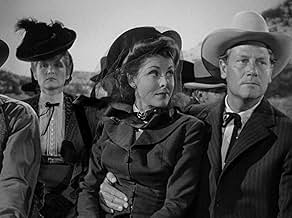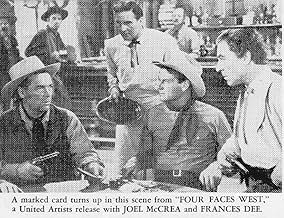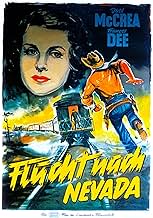CALIFICACIÓN DE IMDb
7.0/10
1.1 k
TU CALIFICACIÓN
Agrega una trama en tu idiomaIn New Mexico, a cowpoke forces a banker at gunpoint to give him a loan without collateral in exchange for an IOU, but the marshal and his posse chase after him.In New Mexico, a cowpoke forces a banker at gunpoint to give him a loan without collateral in exchange for an IOU, but the marshal and his posse chase after him.In New Mexico, a cowpoke forces a banker at gunpoint to give him a loan without collateral in exchange for an IOU, but the marshal and his posse chase after him.
- Dirección
- Guionistas
- Elenco
- Premios
- 1 nominación en total
Walter Bacon
- Baggage Clerk
- (sin créditos)
Opiniones destacadas
This is one of those independent films that turns into a classic. A previous reviewer had noted that not a shot was fired nor a punch thrown in this western and I ran it again to be sure. Absolutely correct.
Joel McCrea is the prototype strong silent western hero, his Virginian character now moved to the southwest. He's an amiable cuss, not a bad guy, a cowboy down on his luck who needs some quick cash. He robs the bank in a town where down the street, Pat Garrett is giving a speech about law and order. The embarrassed federal marshal, played by Charles Bickford gets together a posse and pursues McCrea across New Mexico.
Along the way, McCrea meets nurse Frances Dee and gambler Joseph Calleia who has a very ambiguous part. Because it's Joseph Calleia whose stock and trade is movie criminals you expect betrayal. Actually Calleia turns out to be McCrea's friend.
When McCrea goes back on the run the plot then turns into a mini-version of Three Godfathers. I won't say any more other than with Joel McCrea as hero, you're not going to be let down.
The film was produced by Harry "Pop" Sherman who was the original producer of the Hopalong Cassidy series. Hoppy was a noble a western hero as you can get and that's what Sherman gives us here.
This is one of the few films that Mr.and Mrs. Joel McCrea did together. And it's a work they can be proud of.
Joel McCrea is the prototype strong silent western hero, his Virginian character now moved to the southwest. He's an amiable cuss, not a bad guy, a cowboy down on his luck who needs some quick cash. He robs the bank in a town where down the street, Pat Garrett is giving a speech about law and order. The embarrassed federal marshal, played by Charles Bickford gets together a posse and pursues McCrea across New Mexico.
Along the way, McCrea meets nurse Frances Dee and gambler Joseph Calleia who has a very ambiguous part. Because it's Joseph Calleia whose stock and trade is movie criminals you expect betrayal. Actually Calleia turns out to be McCrea's friend.
When McCrea goes back on the run the plot then turns into a mini-version of Three Godfathers. I won't say any more other than with Joel McCrea as hero, you're not going to be let down.
The film was produced by Harry "Pop" Sherman who was the original producer of the Hopalong Cassidy series. Hoppy was a noble a western hero as you can get and that's what Sherman gives us here.
This is one of the few films that Mr.and Mrs. Joel McCrea did together. And it's a work they can be proud of.
Not a single shot is fired nor is one punch thrown in director Phil Green's "Four Faces West", starring Joel McCrea and Frances Dee. This is just one of the remarkable features of this absolutely first rate western. A down-and-out cowboy "borrows" $2000 from a reluctant banker in Santa Maria, New Mexico. During his escape he earns the attention of a lovely railroad nurse (played by real-life wife Frances Dee), who tries mightily to save our hero. His escape into the New Mexico badlands and his ultimate redemption (he stops to help a critically ill family at an isolated ranch, thereby insuring his capture) form the exciting climax to the story. Fine performances by Charles Bickford (as legendary lawman Pat Garrett) and Joseph Calleia are among those of a distinguished supporting cast, including William Conrad and John Parrish. An exciting and uplifting cinematic experience. Highly recommended!
Joel McCrea and Francis Dee are exceptional people. They made this one of the best family westerns of all time. To bad there are not anymore actors or actresses like this anymore. We have hit a low in good clean acting, and good movie plots.
Nicely paced Western with different kind of story line and excellent use of wide-open vistas. First half is surprisingly easy-going, even with the brief robbery scene. My guess is that McCrea had a lot to do with putting together this independent production. It certainly provides his real life wife Frances Dee with a plum part. Their growing attachment during that first half appears both real and rather charming, and also makes good use of the quietly observant Calleia and an obnoxious little boy who should be riding next to W C Fields as punishment. Then too, the apparently authentic legend of 'paso por aqui' is skillfully integrated into the movie's basic theme.
The second half is more routine as the posse tries to track down McCrea while he flees across the badlands. The afflicted ranch scene is rather overdone as is the heavenly choir at the end. All in all, we don't need to be hit over the head since the movie's intentions have been clear for some time. An interesting question concerns whether the story would have achieved more clout had we not known early on that McCrea was stealing the money for noble reasons, though I don't believe we ever find out the details. Two good unexpected touches-- the bull ride to throw off the posse, and what a sight that makes! Also, despite all the eager bounty hunters with their six-guns in evidence, I don't believe a single shot is fired throughout the 90 minutes.
Perhaps that last point is not too surprising since the personal McCrea appears to have been very much his own man, and not exactly the flashy Hollywood type. One thing for sure, he never overplayed any of his many roles. In fact, his presence here does nothing that would call attention to himself. In a part that calls for an air of quiet nobility, that's exactly what we get and to fine effect. Too bad, those quiet manly virtues from overlooked performers such as McCrea are largely absent among today's many over-sized movie egos.
The second half is more routine as the posse tries to track down McCrea while he flees across the badlands. The afflicted ranch scene is rather overdone as is the heavenly choir at the end. All in all, we don't need to be hit over the head since the movie's intentions have been clear for some time. An interesting question concerns whether the story would have achieved more clout had we not known early on that McCrea was stealing the money for noble reasons, though I don't believe we ever find out the details. Two good unexpected touches-- the bull ride to throw off the posse, and what a sight that makes! Also, despite all the eager bounty hunters with their six-guns in evidence, I don't believe a single shot is fired throughout the 90 minutes.
Perhaps that last point is not too surprising since the personal McCrea appears to have been very much his own man, and not exactly the flashy Hollywood type. One thing for sure, he never overplayed any of his many roles. In fact, his presence here does nothing that would call attention to himself. In a part that calls for an air of quiet nobility, that's exactly what we get and to fine effect. Too bad, those quiet manly virtues from overlooked performers such as McCrea are largely absent among today's many over-sized movie egos.
Four Faces West (AKA: They Passed This Way) is directed by Alfred E. Green and collectively adapted to screenplay by C. Graham Baker, Teddi Sherman, William Brent and Milarde Brent from the novel Paso por acqui written by Eugene Manlove Rhodes. It stars Joel McCrea, Francis Dee, Charles Bickford and Joseph Calleia. Music is by Paul Sawtell and cinematography by Russell Harlan.
Ross McEwen (McCrea) robs the bank of Santa Maria but requests only $2,000 and issues an I.O.U. to the bank manager with the promise of paying back the money. The bank manager, aggrieved and agitated, puts a bounty of $3,000 on McEwen's head and quickly finds the law, in the form of Sheriff Pat Garrett (Bickford), aiding his cause. But McEwen is no ordinary thief, and as he makes his way across the lands during his escape, revelations and relationships will reveal something quite extraordinary.
All the things are in place here for a conventional 1940s Western movie, with the robbery of a bank followed by a posse pursuit, a serious sheriff on the case, a pretty gal turning heads and some card playing of course. Yet this is far from being a conventional Oater. Old fashioned? Yes! Definitely, but it's a beautifully crafted picture that relies on characterisations - locations - and a story of such humanistic redemptive qualities; it demands to be better known.
It has rightly been pointed out before that no blood is shed here, no bullets are fired; in fact bullets play a key part of the story for a different reason, but the action quota here is still very high. With blazing fire tactics used at one point and pursuits through the rocky terrain very much in evidence, the pic often raises the pulses. Tension is also provided by the efforts of McEwen to evade the attentions of the posse and the law, with some intelligent and believable methods put into action. The romance angle is also thoughtful and never cloying, given credence by real life lovers McCrea and Dee, while non white actors play South American characters without charges of stereotype or fodder being brought into play.
With first grade black and white photography from Harlan (New Mexico Tourist Board done a favour here), unfussy direction by Green, and a quartet of great performances by the principal players leading from the front, Four Faces West (not the best of titles to be fair) is a treat for the Western fan. It may lack a "shock" outcome but it sure as heck fire casts off cynicism and makes you feel better about people in general. Bravo! 8/10
Ross McEwen (McCrea) robs the bank of Santa Maria but requests only $2,000 and issues an I.O.U. to the bank manager with the promise of paying back the money. The bank manager, aggrieved and agitated, puts a bounty of $3,000 on McEwen's head and quickly finds the law, in the form of Sheriff Pat Garrett (Bickford), aiding his cause. But McEwen is no ordinary thief, and as he makes his way across the lands during his escape, revelations and relationships will reveal something quite extraordinary.
All the things are in place here for a conventional 1940s Western movie, with the robbery of a bank followed by a posse pursuit, a serious sheriff on the case, a pretty gal turning heads and some card playing of course. Yet this is far from being a conventional Oater. Old fashioned? Yes! Definitely, but it's a beautifully crafted picture that relies on characterisations - locations - and a story of such humanistic redemptive qualities; it demands to be better known.
It has rightly been pointed out before that no blood is shed here, no bullets are fired; in fact bullets play a key part of the story for a different reason, but the action quota here is still very high. With blazing fire tactics used at one point and pursuits through the rocky terrain very much in evidence, the pic often raises the pulses. Tension is also provided by the efforts of McEwen to evade the attentions of the posse and the law, with some intelligent and believable methods put into action. The romance angle is also thoughtful and never cloying, given credence by real life lovers McCrea and Dee, while non white actors play South American characters without charges of stereotype or fodder being brought into play.
With first grade black and white photography from Harlan (New Mexico Tourist Board done a favour here), unfussy direction by Green, and a quartet of great performances by the principal players leading from the front, Four Faces West (not the best of titles to be fair) is a treat for the Western fan. It may lack a "shock" outcome but it sure as heck fire casts off cynicism and makes you feel better about people in general. Bravo! 8/10
¿Sabías que…?
- TriviaFour Faces West (1948) was Harry Sherman's last film. He died on 25 Sep 1952. According to modern sources, Sherman, who had made his reputation as a producer of low-budget Westerns, was particularly proud of the million-dollar Four Faces West. The picture, however, was a box office flop.
- ErroresThe mail hack was supposed to be leaving at 5 am, but the shadows are from an overhead sun indicating that the scene was filmed around midday.
- ConexionesFeatured in Frances Farmer Presents: Four Faces West (1958)
Selecciones populares
Inicia sesión para calificar y agrega a la lista de videos para obtener recomendaciones personalizadas
- How long is Four Faces West?Con tecnología de Alexa
Detalles
- Fecha de lanzamiento
- País de origen
- Idioma
- También se conoce como
- They Passed This Way
- Locaciones de filmación
- El Morro National Monument, near, Ramah, New Mexico, Estados Unidos(Inscription Rock)
- Productoras
- Ver más créditos de la compañía en IMDbPro
Taquilla
- Presupuesto
- USD 1,200,000 (estimado)
- Tiempo de ejecución1 hora 29 minutos
- Color
- Relación de aspecto
- 1.37 : 1
Contribuir a esta página
Sugiere una edición o agrega el contenido que falta

Principales brechas de datos
By what name was Four Faces West (1948) officially released in India in English?
Responda

































